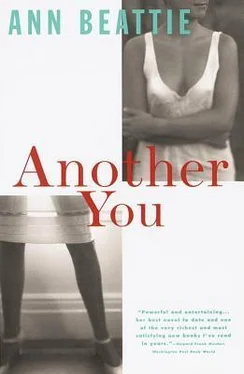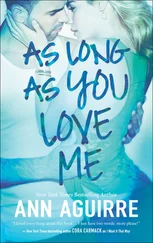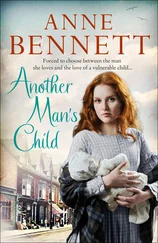Ann Beattie - Another You
Здесь есть возможность читать онлайн «Ann Beattie - Another You» весь текст электронной книги совершенно бесплатно (целиком полную версию без сокращений). В некоторых случаях можно слушать аудио, скачать через торрент в формате fb2 и присутствует краткое содержание. Год выпуска: 2014, Издательство: Vintage Books, Жанр: Современная проза, на английском языке. Описание произведения, (предисловие) а так же отзывы посетителей доступны на портале библиотеки ЛибКат.
- Название:Another You
- Автор:
- Издательство:Vintage Books
- Жанр:
- Год:2014
- ISBN:нет данных
- Рейтинг книги:5 / 5. Голосов: 1
-
Избранное:Добавить в избранное
- Отзывы:
-
Ваша оценка:
- 100
- 1
- 2
- 3
- 4
- 5
Another You: краткое содержание, описание и аннотация
Предлагаем к чтению аннотацию, описание, краткое содержание или предисловие (зависит от того, что написал сам автор книги «Another You»). Если вы не нашли необходимую информацию о книге — напишите в комментариях, мы постараемся отыскать её.
Another You — читать онлайн бесплатно полную книгу (весь текст) целиком
Ниже представлен текст книги, разбитый по страницам. Система сохранения места последней прочитанной страницы, позволяет с удобством читать онлайн бесплатно книгу «Another You», без необходимости каждый раз заново искать на чём Вы остановились. Поставьте закладку, и сможете в любой момент перейти на страницу, на которой закончили чтение.
Интервал:
Закладка:
“Forgive my naïveté,” Freer said. “I only began to receive information this morning on what is apparently to you a very well-understood situation. Forgive me also if I wonder aloud whether it might not have been better if you consulted with me, as department chair, assuming that you realized there was some probability this situation might be made public?” Freer fingered the tie’s point, as if testing the sharpness of a needle. “Marshall — McCallum was at your home last night? Was I wrong in thinking there was not much love lost between you and McCallum?”
“Why do you automatically believe Livan Baker?” Marshall said.
Once again, Freer opened his mouth, then closed it without speaking. After a pause, he said, “Marshall, have you spoken to your wife?”
Instantly, the hallway began to waver out of focus. What was Freer talking about? Where was Freer going? Why were the students clearing such a large path around them in the hallway, he having been about to teach “The Gulf” by Derek Walcott, Freer with his sneering attitude and his steam-pressed creases and his tie folded queerly in his pocket. The question was, had he spoken to his wife. He had not, but wouldn’t she have called if something had happened to Evie? If something was wrong?
“You don’t know what happened when you left your house,” Freer said. It was a statement, not a question.
“What happened?” Marshall said. He tried to catch up with Freer, but his legs were heavy. Something terrible had happened. Something terrible had happened to Sonja. Two policemen were walking toward them in the hallway.
“Is Sonja all right?” Marshall said.
“She is,” Freer said.
“Who are they?” Marshall asked, staring at the approaching policemen.
“Who do you think they are?”
“What’s happened?” Marshall said.
To the policemen, Freer said, “You doubted I could locate my colleague?”
“We’re new to the force. Rookies are known to be antsy,” the blond cop said. He had a gold incisor and an acne-spattered chin. He looked to Marshall the same age as most of his students. The other policeman was handsome, except for green eyes that narrowed to slits as he looked at Marshall. “How ya doin’?” he said, extending his hand.
“He doesn’t know what happened,” the blond cop said to his partner.
“You haven’t spoken to your wife?” the other cop said. His eyes were gone. The green all but disappeared. Marshall wanted to ask if Sonja was all right — or had he asked that before, had somebody said yes? — but he could only echo, “My wife.”
“She’s not hurt is she?” Marshall said. He had reached out to brace himself by putting his hand on Freer’s shoulder.
“Sonja’s okay,” Freer said. “McCallum’s wife went off the deep end this morning and went over to your house and attempted to stab him to death.”
The blond cop’s nod corroborated this.
“This is a terrible thing to find out,” Freer said to the cops, nodding in Marshall’s direction as if he couldn’t hear. He could hear, but the sound was wavery; trying to hear distinctly was like what could happen visually when you were driving on a hot day, seeing a mirage in front of your car, knowing it was only heat rising from asphalt. Freer had turned his back and was walking away. Freer was walking away: he’d been a mirage.
“He isn’t dead, is he?” Marshall said.
“If it was known, we’d know.”
What was this, some Zen riddle?
The other cop saw his confusion; he said, “He’s in surgery. Got knifed pretty bad.”
“He got knifed in my house?” Marshall said. It was beginning to register. McCallum had had a fight with his wife. She must have found out where they lived and gone there. What was he expected to do, try to remember the story about the bag lady near Boston Common? This was like one of those nightmares, one of those anxiety dreams in which he wasn’t prepared for class, all he could do was fill time, stand there making a fool of himself and suffering intensely as the students realized he didn’t know what he was talking about. A bag lady? What was that about? The class was to be on Derek Walcott’s “The Gulf.” Every thought he had ever had about Derek Walcott rushed out of his brain. Thank God he was not in the classroom.
“We’d like to take you down to headquarters and have you describe the previous twenty-four hours,” Green Eyes said.
“Twenty-four hours,” Marshall echoed. How could he begin to remember it all? And what was he to do if only irrelevant, inappropriate things continued to subsume his thoughts, such as the slightly minty smell of Cheryl Lanier’s shampoo, the now-vivid image of the pizza delivery boy, every detail of his face suddenly clear, the bruise-like bags under his eyes, the lock of hair curving over his forehead. He could hear the boy’s footsteps on the stairs, see the square silver pad from which the pizza was slipped — that familiar magic prop of our time, the sort of top hat from which a rabbit would be pulled — smell marijuana seeping from the apartment, from which Livan Baker and her boyfriend had suddenly materialized.
Both cops were looking at him, frowning, neither one speaking.
“How ya doin’? This comes as a shock, I know,” the green-eyed cop said. “You left for school this morning, next thing you know you’re walking down the hall with two cops, hearing about an attempted murder in your house.”
“Do you think he’s going to die?” Marshall said.
“Those surgeons try very hard. If he dies, it’s not because they didn’t try,” the narrow-eyed cop said. “I personally have a lot of respect for surgeons.”
“It’s not the greatest sign if we get beeped here,” the other cop said. “Though to tell you the truth, they’ve beeped us for nothing. You stop thinking it’s necessarily going to be something crucial after the first hundred or so stupid beeps.”
All right, then: McCallum’s wife had stabbed him, but he would be fine. McCallum was not by any stretch of the imagination a friend of his, except that when you didn’t really have any friends, it was difficult to disallow acquaintances. He had been thinking that, something like that, not too long ago, on a day when Cheryl Lanier came to his office to borrow a poetry anthology, and when she had left, he had looked out the window and seen her, seen a dog, as well, and he had reflected that there was every possibility he didn’t love anyone, although that was absurd. Absurd, but a thought he had had two or three times before, remembering that he’d thought it before only when the idea hit again. Now he concentrated on thinking otherwise. He loved his wife. He loved Evie. He loved his brother, Gordon.
“Freer wanted to tell me himself?” Marshall said.
“Yeah, but it was our obligation to proceed directly. We told him that and gave him five minutes,” the blond cop said. “I don’t know what this stuff was about his bringing you to the station. Delusions of grandeur, or something.”
“People don’t know how the law works,” the other cop said.
“Rest assured, there are no charges against you,” the blond cop said. “Nobody thinks you stabbed your friend, Professor.” Was this happening? “Mrs. McCallum walked into the post office and told the clerk she’d done it, blood all over her,” the blond cop said. “You know, gas station attendants are getting confessions all the time. People pull in and roll down their window and it’s like a drive-through confessional. Or they buy a candy bar inside and spill the beans, they just blurt it out while the guy’s giving them change. Go figure.”
At the station house, Marshall drank a cup of lukewarm coffee. He was simultaneously videotaped and tape-recorded, while the blond cop took notes in shorthand and his partner asked every third question. Marshall was tormented about how much to say, how much to tell them about Livan Baker and whatever McCallum’s involvement had been with her. He was surprised to see how withholding he could become; he volunteered nothing, half out of sympathy with McCallum, who might be dying as he sat in the station house talking to the cops, half because he felt sure the cops would do nothing to clarify matters for him, and he thought now, deep down, that McCallum had been telling the truth, that Livan Baker’s involvement with McCallum had been far less than she claimed.
Читать дальшеИнтервал:
Закладка:
Похожие книги на «Another You»
Представляем Вашему вниманию похожие книги на «Another You» списком для выбора. Мы отобрали схожую по названию и смыслу литературу в надежде предоставить читателям больше вариантов отыскать новые, интересные, ещё непрочитанные произведения.
Обсуждение, отзывы о книге «Another You» и просто собственные мнения читателей. Оставьте ваши комментарии, напишите, что Вы думаете о произведении, его смысле или главных героях. Укажите что конкретно понравилось, а что нет, и почему Вы так считаете.












